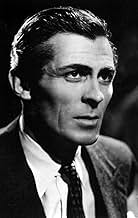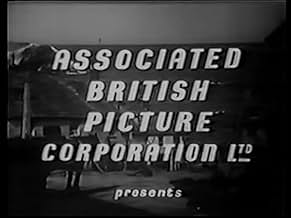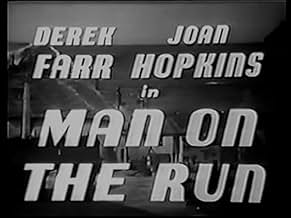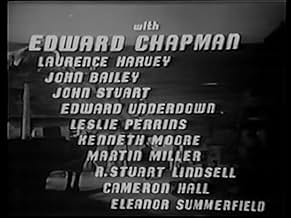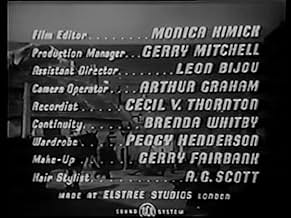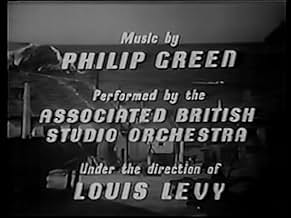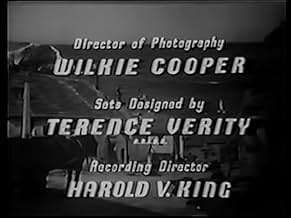IMDb RATING
6.7/10
532
YOUR RATING
In post-war Britain, an army deserter unwittingly gets involved in murder and armed robbery and enlists the aid of a war widow to help clear his name.In post-war Britain, an army deserter unwittingly gets involved in murder and armed robbery and enlists the aid of a war widow to help clear his name.In post-war Britain, an army deserter unwittingly gets involved in murder and armed robbery and enlists the aid of a war widow to help clear his name.
Howard Marion-Crawford
- 1st Paratrooper
- (as Howard Marion Crawford)
Kenneth More
- Corporal Newman
- (as Kenneth Moore)
Martin Miller
- Cafe Proprietor
- (as Martyn Miller)
- Director
- Writer
- All cast & crew
- Production, box office & more at IMDbPro
Featured reviews
"Man on the Run" is interesting for several reasons.
One is the postwar atmosphere in England and the problem they had with deserters, many of whom were on the run and resorting to crime. Here in the U. S., 21,000 people were charged and sentenced for desertion during World War II - 49 were sentenced to death, but only one sentence was carried out.
Although over 21,000 American soldiers were given varying sentences for desertion during World War II, including 49 death sentences, Slovik's death sentence was the only one that was carried out.
The main character in this is Peter Burden (Derek Farrar). After four years in the service, he needed extra time on his leave because his sister was dying. He was refused and stayed with her anyway.
Peter is in hiding when approached by someone who knew him, a Corp. Newman (Kenneth More, in a small part). Newman wants blackmail money; instead, Peter takes off.
When Peter tries to pawn his gun, the pawnshop is robbed at the same time by two men. The police think it's three. He is being chased through the streets when he runs into an apartment building. There he meets a widow, Jean Adams (Joan Hopkins) who agrees to help him. She hides him and lets him stay at her place.
Peter knows certain distinguishing features of one of the men and feels if he could just find him, the police would learn of his innocence. By a series of circumstances, the police zero in on Jean, so she and Peter take off to a friend's place out of London.
The chase continues, and it's Jean who actually sees someone in a cafe that she thinks is one of the robbers.
Too many coincidences in the story, but the actors are likeable, and you do pull for both of them.
Not only did More appear, but all during the film, I kept thinking one of the police detectives looked like Laurence Harvey. That's probably because it was Laurence Harvey.
One is the postwar atmosphere in England and the problem they had with deserters, many of whom were on the run and resorting to crime. Here in the U. S., 21,000 people were charged and sentenced for desertion during World War II - 49 were sentenced to death, but only one sentence was carried out.
Although over 21,000 American soldiers were given varying sentences for desertion during World War II, including 49 death sentences, Slovik's death sentence was the only one that was carried out.
The main character in this is Peter Burden (Derek Farrar). After four years in the service, he needed extra time on his leave because his sister was dying. He was refused and stayed with her anyway.
Peter is in hiding when approached by someone who knew him, a Corp. Newman (Kenneth More, in a small part). Newman wants blackmail money; instead, Peter takes off.
When Peter tries to pawn his gun, the pawnshop is robbed at the same time by two men. The police think it's three. He is being chased through the streets when he runs into an apartment building. There he meets a widow, Jean Adams (Joan Hopkins) who agrees to help him. She hides him and lets him stay at her place.
Peter knows certain distinguishing features of one of the men and feels if he could just find him, the police would learn of his innocence. By a series of circumstances, the police zero in on Jean, so she and Peter take off to a friend's place out of London.
The chase continues, and it's Jean who actually sees someone in a cafe that she thinks is one of the robbers.
Too many coincidences in the story, but the actors are likeable, and you do pull for both of them.
Not only did More appear, but all during the film, I kept thinking one of the police detectives looked like Laurence Harvey. That's probably because it was Laurence Harvey.
Most enjoyable and fast moving film from Lawrence Huntington in an amazingly crisp and clear Blu-ray print. Not incredibly original story as the title may suggest but the twist here is the background of some 20,000 deserters in the UK desperately trying to evade capture and survive on the fringe of society. Wonderful location shooting on the edge of Soho, Seven Dials and Mayfair plus some unbelievably effective set design and not forgetting the village of Corfe Castle at the start. When we shift to Wapping the pub interior is so authentic I am trying to work out just which one it is but its all done in the studio, fantastic job. Performances are fine, some of us groan when we see Kenneth More at the start, in one of his earlier films, but he is only a bit part as is Alfie Bass who we see for about two seconds. It is Derek Farr and Joan Hopkins who play the leads, perfectly adequately and more to the point convincingly and fortunatley a young Laurence Harvey doesn't have too much to do. A great watch and makes one wonder how many other gems there might be of this period.
10clanciai
What you will remember of this film is the local atmosphere from the post war London with its rather weary aspect both in people and their minds and the shaggy streets, ultimately leading you down to old Wapping with one of the most genuine pub atmospheres found in any film, but there is a long way to go before that.
You will also remember the difficult case of 20,000 deserters after the war, many of them turning to criminality for having no other choice. That's the clinch in which our hero finds himself, when a burglary takes place the moment he is trying to pawn his old gun without bullets, the two robbers in desperation shooting both the clerk and, when on the run, a policeman fatally - the first casualty in the film. The clerk recovers and gives a description of our hero, whom he saw, while the two burglars were masked. So our hero finds himself wanted for murder. Could you get into any deeper sea of trouble?
It's also memorable for the fine performance by Joan Hopkins, who plays a widow who believes in our hero's innocence, Kenneth More has a small part in the beginning, which turns out fatal for our hero on a constant run, and Laurence Harvey is a policeman - neither is sympathetic. Derek Farr plays our hero convincingly enough, a completely ordinary man with an inordinate amount of bad luck, having lost practically all his family in the war. It's a sad story but well made, and the beautiful music adds some extra romantic and melancholy charm to it. In spite of the poor technical quality, I must give it almost a full score for its interesting story of an eloquent script, fluent tempo and excellent cinematography.
You will also remember the difficult case of 20,000 deserters after the war, many of them turning to criminality for having no other choice. That's the clinch in which our hero finds himself, when a burglary takes place the moment he is trying to pawn his old gun without bullets, the two robbers in desperation shooting both the clerk and, when on the run, a policeman fatally - the first casualty in the film. The clerk recovers and gives a description of our hero, whom he saw, while the two burglars were masked. So our hero finds himself wanted for murder. Could you get into any deeper sea of trouble?
It's also memorable for the fine performance by Joan Hopkins, who plays a widow who believes in our hero's innocence, Kenneth More has a small part in the beginning, which turns out fatal for our hero on a constant run, and Laurence Harvey is a policeman - neither is sympathetic. Derek Farr plays our hero convincingly enough, a completely ordinary man with an inordinate amount of bad luck, having lost practically all his family in the war. It's a sad story but well made, and the beautiful music adds some extra romantic and melancholy charm to it. In spite of the poor technical quality, I must give it almost a full score for its interesting story of an eloquent script, fluent tempo and excellent cinematography.
Although I saw this on a very poor DVD transfer it held my attention from beginning to end. Yes, as other reviewers have pointed out, there's nothing new here, but it's expertly done, and it's interesting to know that there were apparently 20,000 deserters on the run in the UK in 1949, and one imagines that many of them were as hard-done-by as our hero, but I won't spoil anything by revealing why he deserted. The film is certainly sympathetic to those 20,000 men who get the blame, by several representative members of the cast, for everything that's wrong with post-war Britain. Derek Farr is excellent in the main role as the deserter who has to raise some money when Kenneth More, who had served in the same outfit, happens into the pub where he's working under an alias and decides to blackmail him. While he's trying to pawn a gun the pawnshop is robbed and a policeman killed making him one of the suspects. Joan Hopkins is the sympathetic woman who helps him. Edward Chapman is the inspector investigating the case with ever-increasing impatience. Laurence Harvey, although billed fourth, has little to do as a sergeant with a soft spot for Hopkins. Plenty of noir atmosphere. Recommended.
Derek Farr deserted from the British Army after four years of service and went underground. Now he is at the end of his rope, so he takes his service revolver to a pawn shop.... to pawn it. While he's standing there, two other men enter, knock out the owner and flee, killing a bobby as they go. Now Farr is really being pursued and he randomly stops Joan Hopkins... who agrees to help him.
There are definite noir elements in this movie, with discussion the estimated 20,000 deserters and some grimy cinematography by DP Wilkie Cooper, but that's about the limits of it. Otherwise, writer-director Lawrence Huntington has turned out a reasonably taut man-accused movie. Despite a decent story, the movie itself is curiously inert, with a lot of talk and not much movement.
Farr is clearly not wearing his hairpiece for this movie, an odd choice for a romantic lead type, but that, I suppose, it part of the noir aspect of it. Watch out for Laurence Harvey in his second screen appearance, playing a detective. He's only mildly creepy in this one.
There are definite noir elements in this movie, with discussion the estimated 20,000 deserters and some grimy cinematography by DP Wilkie Cooper, but that's about the limits of it. Otherwise, writer-director Lawrence Huntington has turned out a reasonably taut man-accused movie. Despite a decent story, the movie itself is curiously inert, with a lot of talk and not much movement.
Farr is clearly not wearing his hairpiece for this movie, an odd choice for a romantic lead type, but that, I suppose, it part of the noir aspect of it. Watch out for Laurence Harvey in his second screen appearance, playing a detective. He's only mildly creepy in this one.
Did you know
- TriviaThe dialogue includes several clear uses of "basket" as a minced oath for "bastard". However the film was given an 'A' certificate (for "Adult Audiences") by the British Board of Film Censors, because of the depiction of an armed robbery.
- GoofsKenneth More is listed as Kenneth Moore in the opening credits but is listed correctly in the closing credits.
- Quotes
Sgt. Peter Burden, alias Brown: Well, do you believe any of this, or am I just wasting my time?
Details
- Runtime
- 1h 22m(82 min)
- Color
- Aspect ratio
- 1.37 : 1
Contribute to this page
Suggest an edit or add missing content

